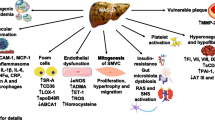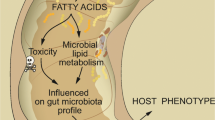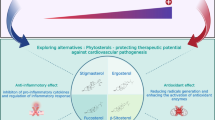Abstract
The present study describes the effects of several high-fat low-cholesterol antiatherogenic diets on the hepatic lipid peroxidation and hepatic antioxidant systems in apolipoprotein E-deficient mice. Eighty mice were distributed into five groups and fed with regular mouse chow or chow supplemented with coconut, palm, olive and sunflower seed oils. After ten weeks, they were sacrificed and the livers were removed so that lipid peroxidation and α-tocopherol concentrations, and superoxide dismutase, glutathione peroxidase and glutathione reductase activities could be measured. The size of the atherosclerotic lesions in the aortas was also measured. Results showed that the diets supplemented with olive oil, palm oil or sunflower seed oil significantly decreased the size of the lesion. However, there was an association between those mice that were on diets supplemented with palm or coconut oils and a significant increase in hepatic lipid peroxidation. This association was not found in animals fed with olive or sunflower seed oils, the diets with the highest content of vitamin E. The dietary content of vitamin E was significantly correlated (r = 0.98; p < 0.05) with the hepatic concentration of this compound. Our study suggests that the high content of vitamin E in olive oil or sunflower seed oil may protect from the undesirable hepatotoxic effects of high-fat diets in apo E-deficient mice and that this should be taken into account when these diets are used to prevent atherosclerosis.
Similar content being viewed by others
References
Zhang SH, Reddick RL, Burkey B, Maeda N: Diet-induced atherosclerosis in mice heterozygous and homozygous for apolipoprotein E gene disruption. J Clin Invest 94: 937–945, 1994
Rudel LL, Johnson FL, Sawyer JK, Wilson MS, Parks JS: Dietary polyunsaturated fat modifies low-density lipoproteins and reduces atherosclerosis in nonhuman primates with high and low diet responsiveness. Am J Clin Nutr 62: 463S–470S, 1995
Zhang SH, Reddick RL, Piedrahita JA, Maeda N: Spontaneous hypercholesterolemia and arterial lesions in mice lacking apolipoprotein E. Science 258: 468–471, 1992
Osada J, Joven J, Maeda N: The value of apolipoprotein E knockout mice for studying the effects of dietary fat and cholesterol on atherogenesis. Curr Opin Lipidol 11: 25–29, 2000
Nakashima Y, Plump AS, Raines EW, Breslow JL, Ross R: Apo E-deficient mice develop lesions of all phases of atherosclerosis throughout the arterial tree. Arterioscler Thromb 14: 133–140, 1994
Staprans I, Pan XM, Rapp JH, Grunfeld C, Feingold KR: Oxidized cholesterol in the diet accelerates the development of atherosclerosis in LDL receptor-and apolipoprotein E-deficient mice. Arterioscler Thromb Vasc Biol 20: 708–714, 2000
Calleja L, París MA, Paul A, Vilella E, Joven J, Jiménez A, Beltrán G, Uceda M, Maeda N, Osada J: Low cholesterol and high-fat diets reduce atherosclerotic lesion development in apoE-knockout mice. Arterioscler Thromb Vasc Biol 19: 2368–2375, 1999
Huber WW, Grasl-Kraupp B, Stekel H, Gschwentner C, Lang H: Inhibition instead of enhancement of lipid peroxidation by pretreatment with the carcinogenic peroxisome proliferator nafenopin in rat liver exposed to a high single dose of corn oil. Arch Toxicol 71: 575–571, 1997
Sen CK, Atalay M, Agren J, Laaksonen DE, Roy S, Hanninen O: Fish oil and vitamin E supplementation in oxidative stress at rest and after physical exercise. J Appl Physiol 83: 189–195, 1997
Slim RM, Toborek M, Watkins BA, Boissonneault GA, Hennig B: Susceptibility to hepatic oxidative stress in rabbits fed different animal and plant fats. J Am Coll Nutr 15: 289–294, 1996
Piedrahita JA, Zhang SH, Hagaman JR, Oliver PM, Maeda N: Generation of mice carrying a mutant apolipoprotein E gene inactivated by gene targeting in embryonic stem cells. Proc Natl Acad Sci USA 89: 4471–4475, 1992
Lake BG: Preparation and characterisation of microsomal fractions for studies of xenobiotic metabolism. In: K. Snell, B. Mullock (eds). Biochemical Toxicology (A Practical Approach). IRL Press, Oxford, 1987, pp 183–215
Cabré M, Folch J, Giménez A, Matas C, Parés A, Caballería J, Paternáin JL, Rodés J, Joven J, Camps J: Influence of zinc intake on hepatic lipid peroxidation and metallothioneins in alcoholic rats: Relationship to collagen synthesis. Int J Vit Nutr Res 65: 45–50, 1995
Shearer MJ: Vitamins. In: C.K. Lim (ed). HPLC of Small Molecules (A Practical Approach). IRL Press, Oxford, 1987, pp 157–219
Misra HP, Fridovich I: The role of superoxide anion in the autoxidation of epinephrin and a simple assay for superoxide dismutase. J Biol Chem 247: 3170–3175, 1972
Wheeler CR, Salzman JA, Elsayed NM, Omaye T, Korte DW: Automated assays for superoxide dismutase, catalase, glutathione peroxidase, and glutathione reductase activity. Anal Biochem 184: 193–199, 1990
Paul A, Calleja L, Vilella E, Martínez R, Osada J, Joven J: Reduced progression of atherosclerosis in apolipoprotein-E deficient mice with phenylhydrazine-induced anemia. Atherosclerosis 147: 61–68, 1999
Kris-Etherton PM, Pearson TA, Wan Y, Hargrove RL, Moriarty K, Fishell V, Kris-Etherton BD: High-monounsaturated fatty acid diets lower both plasma cholesterol and triacylglycerol concentrations. Am J Clin Nutr 70: 1009–1015, 1999
Mata P, Alonso R, López-Farré A, Ordovas JM, Lahoz C, Garcés C, Caramelo C, Codoceo R, Blázquez E, de Oya M: Effect of dietary fat saturation on LDL oxidation and monocyte adhesion to human endothelial cells in vitro. Arterioscler Thromb Vasc Biol 16: 1347–1355, 1996
López-Segura F, Velasco F, López-Miranda J, Castro P, López-Pedrera R, Blanco A, Jiménez-Pereperez J, Torres A, Trujillo J, Ordovas JM, Pérez-Jiménez F: Monounsaturated fatty acid-enriched diet decreases plasma plasminogen activator inhibitor type 1. Arterioscler Thromb Vasc Biol 16: 82–88, 1996
Maor I, Hayek T, Coleman R, Aviram M: Plasma LDL oxidation leads to its aggregation in the atherosclerotic apolipoprotein E-deficient mice. Arterioscler Thromb Vasc Biol 17: 2995–3005, 1997
Munday JS, Thompson KG, James KAC, Manktelow JBW: Dietary antioxidants do not reduce fatty streak formation in the C57BL/6 mouse atherosclerosis model. Arterioscler Thromb Vasc Biol 18: 114–119, 1998
Praticó DP, Tangirala RK, Rader DJ, Rokach J, FitzGerald GA: Vitamin E suppresses isoprostane generation in vivo and reduces atherosclerosis in apo E-deficient mice. Nature Med 4: 1189–1192, 1998
Sahish A, George J, Gilburd B, Keren P, Levkovitz H, Harats D: Dietary β-carotene and α-tocopherol combination does not inhibit atherogenesis in an apo E-deficient mouse model. Arterioscler Thromb Vasc Biol 19: 1470–1475, 1999
Paul A, Calleja L, Joven J, Vilella E, Ferré N, Camps J, Girona J, Osada J: Supplementation with vitamin E and/or zinc does not atenÚate atherosclerosis in apolipoprotein E-deficient mice fed a high-fat, high-cholesterol diet: Int J Vit Nutr Res (in press)
Shaish A, Daugherty A, O'sullivan F, Schonfeld G, Heinecke J: Betacarotene inhibits athersclerosis in hypercholesterolemic rabbits: J Clin Invest 96: 2075–2082, 1995
Sun J, Giraud DW, Moxley RA, Driskell JA: β-carotene and α-tocopherol inhibit the development of atherosclerotic lesions in hypercholesterolemic rabbits. Int J Vit Nutr Res 67: 155–163, 1997
Lenaz G: Role of mitochondria in oxidative stress and ageing. Biochim Biophys Acta 1366: 53–67, 1998
Esterbauer H. Cytotoxicity and genotoxicity of lipid-oxidation products. Am J Clin Nutr 57(suppl): 779S–786S, 1993
Nanji AA, Yang EK, Fogt F, Sadrzadeh SM, Dannenberg AJ: Medium chain triglycerides and vitamin E reduce the severity of established experimental alcoholic liver disease. J Pharmacol Exp Ther 277: 1694-1700, 1996
López-Bote CJ, Rey AI, Sanz M, Gray JI, Buckley DJ: Dietary vegetable oils and α-tocopherol reduce lipid peroxidation in rabbit muscle. J Nutr 127: 1176–1182, 1997
Saito M, Nagatsukawa K: Increased susceptibility of liver to lipid peroxidation after ingestion of a high fish oil diet. Int J Vit Nutr Res 64: 144–151, 1994
Author information
Authors and Affiliations
Corresponding author
Rights and permissions
About this article
Cite this article
Ferré, N., Camps, J., Paul, A. et al. Effects of high-fat, low-cholesterol diets on hepatic lipid peroxidation and antioxidants in apolipoprotein E-deficient mice. Mol Cell Biochem 218, 165–169 (2001). https://doi.org/10.1023/A:1007296919243
Issue Date:
DOI: https://doi.org/10.1023/A:1007296919243




